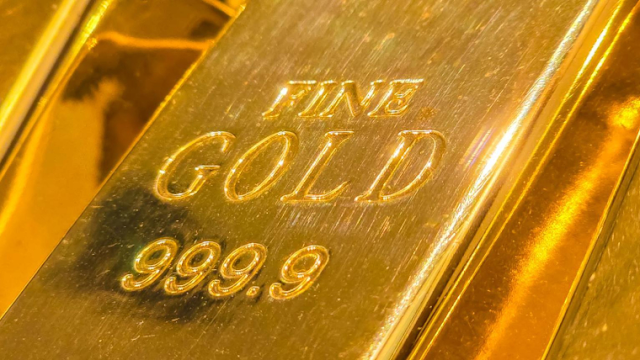Si vous voulez comprendre pourquoi l'Or monte, voici une réponse pertinente
Remarquable article dans le Blog Buttonwood de The Economist.
L'article commente la décision de la Suisse d'arrimer son franc suisse à l'euro, mais au-delà, il y a une explication des enjeux des assouplissements monétaire dans le monde entier. (Quantitative Easing "QE" en anglais)
Le final réjouira les fans de l'or.
-------------
CURRENCIES don't tend to move 7-8% in one day in the modern era but the Swiss National Bank has achieved the feat today. It announced a "minimum" exchange rate target of 1.20 francs per euro (here is the announcement) and the markets fell into line. In reality, the target rate is a ceiling, not a floor; if you turn the cross-rate round, the Swiss want the franc to be worth no more than 83.33 euro cents.
As was remarked in a previous column, the Swiss franc has been rivalling gold as a safe haven and the authorities are worrying, as the statement shows, about the deflationary threat. So it will create Swiss francs to buy "unlimited" amounts of foreign exchange. Since the target rate is based on the euro, presumably it will buy euros. Traditionally, we think of central banks as pursuing the opposite policy; using its foreign exchange reserves to buy the domestic currency (like the UK's doomed effort in 1992). But this is doing the opposite, creating Swiss francs to accumulate reserves. And, in theory the scope is unlimited; the Bank of England ran out of resources in 1992, but the SNB can create francs without number.
Other countries have used QE without explicitly aiming to drive down their exchange rates, although the Bank of England has broadly welcomed the decline in the pound and QE enthusiasts cite the decline in the dollar as an example of the success of the Fed's policy. But this is shock-and-awe stuff and makes one wonder whether other countries will follow suit. As Chris Turner, head of FX strategy at ING, comments
This marks a major new round in the currency war. Could not Japan also set a minimum USD/JPY exchange rate at 75 as a means to battle deflation?
Any policy as aggressive as this is bound to have some side-effects, both domestic and international. The Swiss had been attempting to weaken their currency by a more roundabout route, repurchasing Treasury bills and diverting the money into bank deposits. This policy had already had the effect of making interest rate negative, in the very practical sense that UBS was charging institutional customers who held excess deposits in their accounts. The trouble with this strategy is that most currencies are currently paying little-or-nothing; investors might not mind paying 1% to hold a deposit if they felt the Swiss franc was set to rise 5% a year against the dollar or euro. And as Geoffrey Yu of UBS points out, this approach was limited in scope; deposits had ballooned from Sfr30 billion to Sfr230 billion in just a few weeks, already more than the Sfr200 billion target.
Eventually, one would expect such money creation to fuel inflation. The Swiss monetary base is already 50% of GDP (the equivalent figure for America is 18%) but there are no signs of inflation yet. there are also questions about the financial health of the SNB and about the potential losses if this strategy fails (the losses incurred on previous interventions have sparked calls for the governor's resignation).
The international side-effects may be even greater. It seems that all countries would like to see their currencies decline bar the Chinese who will only let the renminbi strengthen gradually. Some currencies must rise, however, and the Europeans may not be too happy to see the Swiss trying to drive the euro up, especially if the Fed opts for a third round of QE. And what will the Swiss buy exactly? A report in the Frankfurter Allgemeine Zeitung suggests the cautious Swiss have been buying French and German government bonds, not Italian or Spanish (let alone Greek) debt..
But this has had unfortunate consequences. As Mr Yu remarks
It is highly likely that the SNB inadvertently made things worse for themselves (and everyone else); swiftly diversifying into German paper in large amounts caused periphery spreads to widen which inly increased market fears and the subsequent risk aversion forced the euro lower (against the Swiss franc)
This process may continue if the Swiss live up to their promise to buy unlimited amounts of euros. Worse still, the Swiss may still attract deposits from elsewhere who may still despite the currency's perceived safety. Some of the flows into Switzerland may be coming from alarmed Italian and Greek depositors. As Simon Derrick of BNY Mellon comments
Rather than recycle these funds back into the markets they came from the (Swiss) money will be invested into French and German debt (if we believe the FAZ story). In other words, the money continues to flow from the south to the north of the continent (albeit by a slightly indirect route).
It is all a bit reminiscent of the 1930s. when countries went off the gold standard, they gained a competitive march on their rivals, increasing the pressure for such countries to leave the standard as well. If one country devalued by 10%, the next might do so by 15%. QE may similarly begat more QE.
David Bloom of HSBC has a further reflection on the consequences.
We have long argued that the Norwegian krone is a better safe haven play than the Swiss franc. In every respect, the krone has superior qualities. However, the market will now fear that if it pushes the krone (or the Singapore dollar) too far. there will be push back from the various central banks. The market must fear this will cause a sharp escalation in the currency wars. The only safe haven that will not do QE, put in capital controls, or complain about its strength is gold. It must emerge as the winner.








Commentaires